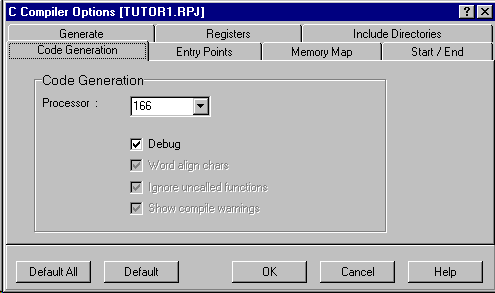
Reads166
Reads166, version 3.10, is Rigel Corporationís Integrated Development Environment for the Infineon / ST Microelectronics 16-bit processors. Reads166 includes an editor, a host-to-board communications system, an assembler, and a C compiler. Reads166 is completely rewritten in native 32-bit code to run on Windows95 and WindowsNT. Reads166 includes a sophisticated project management system to simplify code reusability and version control. The C compiler is rewritten to support a full debugger. The debugger allows you to step through your code with breakpoints and variable watches as the compiled code runs on the target board, similar to the operation of an in-circuit emulator.RMON166 - The Reads166 monitor program
RMON 166 is downloaded after bootstrapping (or it may be placed into ROM) and supports basic memory and port functions. RMON166 allows downloading and running applications programs. The complete so
urce code for user modifications or upgrades is included on disk.
Ra66 - The Reads166 Assembler
Ra66 is an assembler for the C166 family of controllers. It is a multi-pass absolute assembler which generates HEX code directly from assembly source code.
Rc66 - The Reads166 C Compiler
Rc66 is a C Compiler for the C166 family of processors. It compiles code for the tiny memory model which fully resides in the first segment of memory. Rc66 is designed as a low-cost C compiler which provides a quick development cycle for simpler applications which do not need more than 64K of code, or the use of standard C libraries. Rc66 implements a subset of ANSI C. Rc66 works in conjunction with Ra66. First an assembly language program is generated from the C source then a HEX file is created.
The Reads166 software has the following distinctive features:
- Project management for organized software development
- Enhanced graphical user interface for easy monitoring
- Archive storage for source code modules
- Multiple project management with drag and drop module transfers
- Stand alone compiler and editor applications connected to Reads166 in a client / server fashion
- Drag and drop code development
- Mixed mode projects (C and assembler)
- Wizard code generator
- Hardware Aware Dynamic Debugging
Reads166 takes a project-oriented approach to simplify code reusability and version control. You may share code modules among projects or copy and duplicate projects by simply dragging a module from one project and dropping into another. Reads166 supports "Archive Projects" which hold utility prewritten and tested modules which you may simply add to your application program. Archive projects include modules for analog-to-digital conversion, timer routines, input / output routines, serial communication routines, Liquid Crystal Display (LCD) drivers, and keypad routines. Reads166 takes a project-oriented approach to simplify code reusability and version control. You may share code modules among projects or copy and duplicate projects by simply dragging a module from one project and dropping into another. Reads166 supports "Archive Projects" which hold utility prewritten and tested modules which you may simply add to your application program. Archive projects include modules for analog-to-digital conversion, timer routines, input / output routines, serial communication routines, Liquid Crystal Display (LCD) drivers, and keypad routines.
Rc66 produces HEX code from C source in one step, thus eliminating the need for linking. This one-step compilation approach allows reusable code to be stored in source form rather than in object form in libraries, which simplifies library management. Rc66 has an internal profiler which by default, will not produce machine code for functions not called in the program. This way your final HEX code will not grow even if you include source code from an archive which contains unwanted functions. Rc66 produces HEX code from C source in one step, thus eliminating the need for linking. This one-step compilation approach allows reusable code to be stored in source form rather than in object form in libraries, which simplifies library management. Rc66 has an internal profiler which by default, will not produce machine code for functions not called in the program. This way your final HEX code will not grow even if you include source code from an archive which contains unwanted functions.
Rc66 optionally embeds debug code to support dynamic debugging when used with a target board. The debugger allows you to step through your code with breakpoints and variable watches as the compiled code runs on the board, similar to the operation of an in-circuit emulator. The Rc66 compiler / debugger, along with an evaluation board and the RIO-MP prototyping board constitute a very powerful and convenient hardware / software development system. Rc66 optionally embeds debug code to support dynamic debugging when used with a target board. The debugger allows you to step through your code with breakpoints and variable watches as the compiled code runs on the board, similar to the operation of an in-circuit emulator. The Rc66 compiler / debugger, along with an evaluation board and the RIO-MP prototyping board constitute a very powerful and convenient hardware / software development system.
Rc66 supports specific registers. The storage class specifier "predef" (short for "predefined") is introduced to the C grammar to instruct the compiler to refer to the variable by its name rather than to assign and keep the variable in memory. This approach is similar to the use of the storage class specifier "register" where the C variable is kept in a register. With this approach, standard C variable type specifiers and type qualifiers may be used, as in Rc66 supports specific registers. The storage class specifier "predef" (short for "predefined") is introduced to the C grammar to instruct the compiler to refer to the variable by its name rather than to assign and keep the variable in memory. This approach is similar to the use of the storage class specifier "register" where the C variable is kept in a register. With this approach, standard C variable type specifiers and type qualifiers may be used, as in
predef unsigned int SYSCON;
or,
predef bit IEN;
Rc66 fully supports interrupts. Rc66 does not force binding the Interrupt Service Routine (ISR) to the interrupt source in compile time. Rather, the ISR address is placed into the interrupt vector of the microcontroller along with an absolute jump instruction. This way, ISRs may be installed, removed, or switched in run time. Rc66 fully supports interrupts. Rc66 does not force binding the Interrupt Service Routine (ISR) to the interrupt source in compile time. Rather, the ISR address is placed into the interrupt vector of the microcontroller along with an absolute jump instruction. This way, ISRs may be installed, removed, or switched in run time.
Reads166 Version 3.1x (64K code) sells for $300.
Schools, Students (with valid school ID), and US military personal receive a 10% discount on all products.Download Software Download a Free Demo Version of the software (the demo will compile 8K code)
